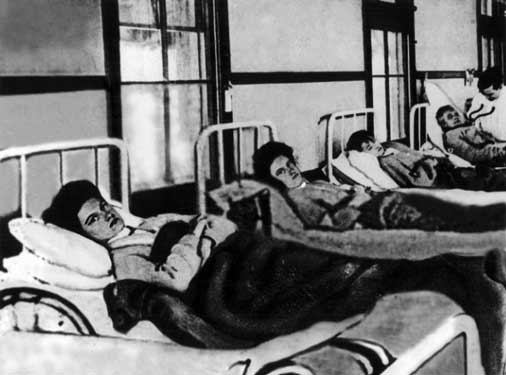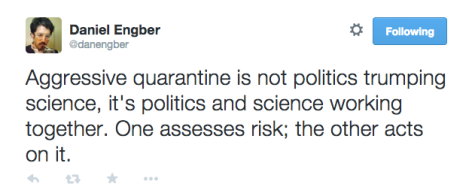A little over a month ago, Liberian Thomas Eric Duncan became the first person in the US to deve lop ebola. In the days before he died, Duncan infected two nurses. Last month, a New York doctor who had been working with Doctors without Borders in Guinea was diagnosed with the disease, becoming the fourth person to develop the disease in the US. The case count is vanishingly small, yet the infections have sparked a highly contagious epidemic of fear and prompted some states to adopt draconian quarantine policies.
lop ebola. In the days before he died, Duncan infected two nurses. Last month, a New York doctor who had been working with Doctors without Borders in Guinea was diagnosed with the disease, becoming the fourth person to develop the disease in the US. The case count is vanishingly small, yet the infections have sparked a highly contagious epidemic of fear and prompted some states to adopt draconian quarantine policies.
In New Jersey and New York, anyone who has come into contact with an Ebola patient will now have to serve a mandatory 21-day quarantine period whether or not they have symptoms of the disease. Other states have passed restrictive rules too. In Connecticut, Ryan Boyko, a graduate student who worked with the Liberian Ministry of Health and never came into contact with anyone infected with Ebola, had to stay in his apartment even after he tested negative for the disease. These policies go well beyond what public health officials recommend.
Last week journalist Dan Engber posted this on Twitter.
It’s a nice sentiment, but I don’t entirely agree. In many cases, the quarantine rules have nothing to do with science. Last month school officials in Kentucky told a teacher that she would need to quarantine herself for 21 days after returning from Kenya, a country that lies 3,000 miles from the epicenter of the epidemic and has reported no cases of Ebola. (In fact, Kenya cancelled all flights to and from the affected countries back in August, a measure that went against the recommendations of the World Health Organization.) In California, parents demanded that a child who had visited Ethiopia stay home from school for 21 days. When the child did show up for class, “the scene at the school was reminiscent of protests when schools were first integrated,” wrote Leslie Marshall in an essay for US News. “More than a dozen parents protested, some calling out things like ‘Protect our kids!’ and ’21-day quarantine!’” Mandating quarantines for individuals because they’ve been to Africa or Dallas isn’t an example of politics and science working together. It’s fear driving politicians to enact bad policies that don’t reduce the risk of Ebola transmission one iota.
I don’t mean to dismiss people’s concern. Ebola is a terrifying disease, and deadly. In a recent essay, Paul Farmer suggested that the fatality rate could be as low as 10% with proper care, but in West Africa the death rate has been hovering closer to 70%. And there’s a lot we don’t know about the disease. Is there a slim chance that a person infected with Ebola could spread the virus before showing symptoms? That sort of transmission is exceedingly unlikely, but it’s not beyond the realm of possibility. Neither is sexual transmission, nor an incubation period longer than 21 days. We know how Ebola typically spreads, but scientists have yet to determine the absolute limits of transmission.
And that uncertainty scares people. The perceived risks start to loom larger than actual risks — like car accidents, or cancer, or the flu. Soon after Duncan died, I interviewed a physician at the University of Wisconsin School of Medicine in Madison. He told me he had seen six people that day who had come to the emergency room because they were concerned they might have Ebola. None of them had any real risk factors. (One mentioned passing through the Dallas airport.) “I’m Ebola-ed out,” he told me.
Proponents of excessive precautions — ones that go well beyond what the science says, and even well beyond common sense — argue that we’re better safe than sorry. But these restrictive measures come at a price. First, we’re infringing on the civil liberties of health workers coming from the front lines of the fight against Ebola. These brave men and women should be returning to parades and ticker tape, not house arrest. But perhaps more importantly, the ever-changing quarantine rules will undoubtedly prompt health workers who might have gone to West Africa to stay home. Who would want to endure the ordeal Kaci Hickox went through? The new policies are also hampering research at home: Last week Louisiana barred 30 infectious disease experts from attending the annual American Society of Tropical Medicine and Hygiene meeting in New Orleans because they had been in West Africa in the past three weeks.
In an editorial in the New England Journal of Medicine, a group of physicians and public health experts compared New York and New Jersey’s declaration of a mandatory quarantine for health workers arriving from West Africa to “driving a carpet tack with a sledgehammer: it gets the job done but overall is more destructive than beneficial.”
* * *
Image credit: Mary Mallon (Typhoid Mary) in the hospital via Wikimedia Commons.

It is no stretch to anticipate that someone, somewhere in the US, would conceal contact with an infected person in order to avoid missing work and losing income for a draconian quarantine.
Sure. Someone might lie about who they’ve been in contact with and end up sick in a major metropolitan area. That already happened with Duncan. He developed symptoms four days before he was admitted to the hospital and the only people he infected were the nurses caring for him. One of those nurses boarded a plane with a fever and flew to Cleveland. She infected no one. My point is that the quarantines don’t reduce the risk of Ebola transmission much at all. If a person doesn’t have symptoms, the likelihood that they would pass on the virus is vanishingly small. Even people in the earliest stages of the disease, those who have a fever, don’t seem to be all that contagious.
Here’s an idea. Let’s quarantine people who buy guns for 21 days. Might actually save lives!